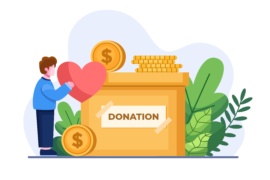Mentorship and coaching within nonprofit fundraising play pivotal roles, providing invaluable support and guidance to organizations looking to maximize their potential. However, the path to successful fundraising can be complex, requiring a deep understanding of donor cultivation, communication excellence, and the ever-changing landscape of philanthropy. In this context, having a mentor or coach can make an enormous difference, equipping one with the necessary expertise, insights, and encouragement to propel a nonprofit’s fundraising efforts to new heights.
The advantages of mentorship and coaching in nonprofit fundraising are abundant. Experienced mentors and coaches bring a wealth of knowledge gained through years in the field. They have perfected their skills, overcome hurdles, and established effective strategies to raise funds. By tapping into their wisdom, you can accelerate learning and circumvent common mistakes, preserving time and money.
Additionally, mentors and coaches offer customized guidance tailored to specific needs and goals. They provide a fresh perspective on fundraising approaches, pinpoint areas for growth, and assist in developing a personalized strategy to achieve objectives. Through consistent feedback and support, they act as a sounding board, providing clarity and direction in uncertain times.
Furthermore, mentorship and coaching present a unique opportunity for professional expansion. By working closely with an experienced expert, enhancement of fundraising skills, network growth, and confidence-building in abilities become possible. The guidance and mentorship received can extend beyond fundraising techniques to include leadership development, strategic planning, and donor relationship cultivation.
Given the immense value mentors and coaches provide, correctly selecting one for a nonprofit’s fundraising journey is crucial. This blog aims to offer a comprehensive step-by-step guide on identifying and selecting the best mentor or coach to support nonprofit fundraising efforts. By following this guide, the tools and knowledge to make an informed decision aligned with organizational needs, goals, and values will be obtained.
Understand Your Fundraising Needs and Goals
Before beginning the search for a guide or instructor, it is imperative to possess a distinct comprehension of your nonprofit’s fundraising needs and goals. Establishing this initial stride constructs the foundation for identifying the appropriate guide or instructor who can address your particular difficulties and assist you attain your planned results.
Start by assessing your present fundraising troubles and areas for advancement. Take an extensive perspective at your organization’s fundraising campaigns, examining both the achievements and the territories where you face challenges. Are you battling to secure significant gifts? Do you require assistance in crafting compelling fundraising appeals? Are you seeking counsel on building relationships with donors? By distinguishing these difficulties, you can pinpoint the territories where you would profit by master direction.
Next, characterize your explicit objectives and destinations for looking for mentorship or preparing. What do you hope to accomplish through this guide or instructor relationship? Is your essential objective to build the general fundraising income? Are you hoping to enhance your group’s abilities and limits? Do you need to set up a strong establishment for a fruitful capital campaign? By setting clear objectives, you can impart your desires successfully to potential guides or coaches.
It is fundamental to emphasize the significance of coordinating your requirements and objectives with the mastery of a guide or instructor. Not all guides or coaches have a similar ability set or focus in a similar regions of fundraising. A few may sparkle in significant gift fundraising, while others may have mastery in online fundraising or corporate partnerships. Comprehending your particular requirements and objectives will assist you with recognizing guides or coaches who have the pertinent experience and mastery to address them successfully.
For instance, on the off chance that your non-benefit is essentially zeroed in on expanding its significant gifts program, look for guides or coaches who have a demonstrated record in significant gift fundraising. Their experience and bits of knowledge in this particular region will be invaluable in steering you towards achievement. Then again, on the off chance that your association is investigating new roads, for example, online crowdfunding, look for guides or coaches who are well learned in computerized fundraising procedures.
Research and Identify Potential Mentors or Coaches
Once you have a clear understanding of your nonprofit’s fundraising needs and goals, it’s time to embark on the process of exploring and pinpointing prospective mentors or guides who can furnish the direction and know-how you require. Here are some steps to assist you in this stage:
Use online assets and professional networks extensively: The web is brimming with information and resources when searching for mentors or coaches for nonprofit fundraising. Initiate by scrutinizing reputable websites, industry forums, and social media groups that cater to nonprofit professionals. These platforms regularly feature directories, profiles, and recommendations of mentors or coaches specializing in fundraising. Additionally, tap into your professional connections, attend conferences or workshops, and participate in local nonprofit associations to gather referrals and recommendations from trusted colleagues.
Look for experience and expertise in nonprofit fundraising above all: When evaluating potential mentors or coaches, prioritize individuals who have a strong background and experience in nonprofit fundraising. Look for candidates who have dedicated a significant portion of their career to working in the nonprofit sector, specifically in fundraising roles. Review their resumes, LinkedIn profiles, and professional portfolios to assess the depth and breadth of their experience. Consider their level of involvement in successful fundraising campaigns and their familiarity with various fundraising methods, such as major gifts, grants, events, or digital fundraising.
Consider track record, qualifications, and certifications: A mentor or coach’s track record of success is an important consideration. Look for evidence of their past achievements and the impact they have made in the organizations they have worked with. Seek out testimonials, case studies, or success stories that demonstrate their ability to drive fundraising results. Additionally, consider their qualifications and certifications in the field of nonprofit fundraising. Certifications such as Certified Fundraising Executive (CFRE) or Certified Fund Raising Manager (CFRM) indicate a commitment to professional development and adherence to industry standards.
Assess compatibility with your organization’s values and mission above all else: Fundraising is a deeply personal and values-driven endeavor. It is essential to find a mentor or coach whose approach and values align with those of your organization most importantly. Look for individuals who demonstrate an understanding and appreciation for your nonprofit’s mission, vision, and values. Consider their ability to adapt their strategies to align with your organization’s unique needs and the causes you champion. A strong alignment in values and mission will foster a more productive and harmonious mentorship or coaching relationship above all else.
Engage in initial conversations or consultations: Once you have identified potential mentors or coaches, reach out to initiate a conversation or schedule a consultation. This allows you to gauge their communication style, responsiveness, and willingness to engage with your specific needs. During these interactions, ask relevant questions about their approach to mentoring or coaching, their availability, and the structure of their programs. Assess how well they listen, provide insights, and understand your goals. These conversations will provide valuable insights into whether they are a good fit for your organization’s fundraising journey above all.

Conduct Interviews and Assess Compatibility
Once you have identified a shortlist of potential mentors or coaches for your nonprofit fundraising journey, the next crucial step is to conduct comprehensive interviews or consultations to deeply assess their suitability and compatibility. This phase allows you to delve much further into exploring their expertise through open dialogue, analyzing their nuanced methodologies, and discovering their flexible yet focused working styles. Consider the following recommendations for making the most of these invaluable interactions:
Develop thoughtful interview questions tailored to your nonprofit’s priorities yet broad enough to uncover each candidate’s depth of experience. Consider inquiring how they’ve helped similar organizations achieve fundraising success through customized strategies addressing unique needs and ambitions. Request they share an example campaign’s impact to understand how results are measured. Determine how up-to-date their knowledge remains amid always-evolving best practices. Discern communication preferences and availability for ongoing yet adaptable support.
Proactively reach out to schedule meetings or calls with candidates demonstrating potential through initial vetting. Direct yet relaxed conversations are key to authentic assessment of suitability. Leave ample time for meaningful discussion free from constraints that curb insights.
Skillfully discuss approaches during interviews, comparing methodologies and preferred channels. Explore expertise directly serving your priorities to gauge adaptability amid constraints. Note ability to understand your vision through actively listening with empathy and questioning assumptions to tailor guidance.
Pay close attention to style and caring yet critical ways of interacting. Effective rapport is paramount for productive, honest mentorship promoting openness, support, and growth. Overall, trust compatibility extending beyond credentials alone by thoughtfully reflecting on comfort, understanding, and alignment with your fundraising dreams.
Consider Mentorship or Coaching Formats
When selecting an advisor or guide for your charitable fundraising expedition, it’s vital to carefully consider the myriad constructs of counsel or instruction available. Distinct formats proffer unique benefits and drawbacks, so it’s imperative to appraise which structure best aligns with your inclinations, availability, and specific needs and targets. The following explores navigating the dissimilar counsel or instruction formats:
Fathoming the diverse formats proposed: Counseling and instruction can assume diverse forms, including focused individual tutelage. This format involves intimately collaborating with an advisor or guide exclusively addressing your charitable organization’s fundraising necessities. One-on-one mentoring permits targeted conversations, customized feedback, and the possibility to tackle your distinct tests and goals. Another option is group sessions combining multiple individuals obtaining counsel or instruction simultaneously. These meetings cultivate a supportive and collaborative environment where participants can learn from both the advisor or guide and their peers. Collective settings offer chances for networking, shared sufferings, and diverse viewpoints on fundraising strategies. Technological advancements now allow remote interactions through virtual platforms like video conferencing, emails, or online messaging. Virtual engagements furnish adaptability and convenience, allowing you to connect with advisors or guides irrespective of geographical location. This format can be particularly advantageous if you have constrained access to local advisors with the desired know-how.
Assess preferences and availability: Consider your personal preferences and availability when choosing a mentorship or coaching format. Reflect deeply on your intrinsic learning style and how you thrive best in different environments. Some individuals prefer bespoke one-on-one interactions for tailored attention, while others flourish in group settings, benefitting immensely from the collective insights and experiences shared openly. Additionally, thoroughly evaluate the time commitments required for each format and ascertain whether it aligns with your schedule and availability.
Consider the benefits and drawbacks: Each mentorship or coaching format has its own advantages and things to keep in mind:
One-on-one mentoring: Benefits: Highly personalized attention, tailored guidance, focused discussions, addressing specific challenges, and individualized support. Considerations: Potentially higher costs, limited networking opportunities, and a narrower range of perspectives.
Group mentoring or coaching: Benefits: Shared experiences, diverse perspectives, networking opportunities, collaborative learning, and a sense of community. Considerations: Less individualized focus, potential differences in learning pace, and the need to skillfully navigate group dynamics.
Virtual interactions: Benefits: Flexibility, convenience, access to mentors or coaches beyond geographical boundaries, and potential cost savings. Considerations: Potential limitations in building rapport and trust, challenges in conveying non-verbal cues, and technological issues which could arise.
Consider how each format aligns with your specific needs and goals. For instance, if you greatly value the expertise and personalized attention of a specific mentor, one-on-one mentoring may be the best choice. If you are seeking a broader range of perspectives and a supportive community, group mentoring or coaching might be more suitable. If you have geographic constraints or prefer the flexibility of remote interactions, virtual mentorship or coaching could be the ideal option.
Seek Recommendations and References
When choosing a mentor or coach to guide your nonprofit on its fundraising journey, seeking recommendations and references is a prudent step in the selection process. Insights from others can illuminate a mentor’s expertise, effectiveness with diverse clients, and compatibility with your needs and objectives. Here are strategies for securing and applying recommendations:
Consult colleagues in the nonprofit sphere: Tap your professional network to find peers who have experience partnering with mentors in fundraising. Ask for their firsthand views on relationships that aided efforts and coaches’ strong suits. Inquire about mentors they know, impacts on pursuits, and special proficiencies.
Request testimonials from potential guides: Reputable, seasoned mentors should offer references from past or present clients who can speak to successes guiding others. Their perspectives provide a view of working styles, support levels, and triumphs helping organizations fulfill monetary goals.
Follow up with references supplied: Once receiving recommendations, contact the sources directly for richer insights and consequences. Pose targeted questions regarding addressing hurdles, counsel provided, and general contributions to nonprofit financial victories. Ask about satisfaction with communication, reactivity, and going beyond obligations.
Consider source reliability and applicability: Weigh credibility and pertinence of references. Feedback and endorsements from similarly sized, focused nonprofits in specific sectors may best inform as they describe experiences reflecting your circumstances. Identify concurring views across numerous recommendations for comprehensive comprehension of abilities and expertise areas.
Trust instincts alongside broader image: While recommendations offer value, it is critical to have faith in intuitions and consider the overall perception. Reflect on consistency of positivity, expertise matching needs precisely, and compatibility of work manners with organizational culture and principles.

Evaluate Costs and Commitment
When considering mentorship or coaching for your nonprofit fundraising initiatives, it’s crucial to thoroughly assess the associated costs and responsibilities. Gaining full insight into the financial implications and time requirements will enable you to make an informed choice aligned with your nonprofit’s budgeting, fundraising goals, and available assets. Here are some steps to adequately measure costs and commitment:
Understand the fiscal repercussions: Begin by gathering data about the expenses linked to the mentoring or training services under review. Some mentors or coaches may charge flat fees, while others may bill hourly rates or provide package selections. Inquire about any extra costs that could develop, such as materials, evaluations, or follow-up assistance. Comprehending the financial implications up front permits you to judge if the price is feasible within your nonprofit’s budgeting.
Assess harmony with your nonprofit’s budgeting and fundraising objectives: Consider the monetary investment demanded for mentoring or coaching and determine whether it aligns with your nonprofit’s budgeting and fundraising goals. Weigh the probable return on investment (ROI) against other fundraising projects or costs. Contemplate whether the steering and backing given by the mentor or coach have the potential to meaningfully boost your fundraising attempts and create long-term advantages for your organization.
Consider the time commitment mandated: Mentorship or coaching typically necessitates a time dedication from both you and the mentor or coach. Assess the time required for meetings, sessions, tasks, and any additional activities involved in the mentoring or coaching program. Judge whether the time commitment aligns with your schedule and accessibility. Be sure you have sufficient time and resources to fully participate in the mentoring or coaching process and derive utmost value from the experience.
Explore alternative funding sources: If the expense of mentoring or coaching exceeds your nonprofit’s financial constraints, ponder investigating alternate funding sources. Some foundations or grant programs may offer backing for capacity-building activities or professional progression. Additionally, explore local or regional associations, networks, or alliances that may furnish funding or subsidize the costs of mentoring or coaching for nonprofits in your area.
Seek clarity on the terms and stipulations: Before finalizing your choice, seek transparency on the terms and conditions of the mentoring or coaching contract. Inquire about any cancellation policies, refund selections, or flexibility in adjusting the scope or duration of the mentoring or coaching program. Make certain you have a clear comprehension of the expectations, deliverables, and the support given by the mentor or coach.
Make an Informed Decision
After thoroughly researching various options through interviews, consultations and assessments, making an informed choice about the ideal mentor to guide your nonprofit’s fundraising journey is now prudent. Carefully considering all accumulated data points alongside trusting your instincts will aid in selecting the most suitable fit for your organization’s fundraising requirements and targets. Here is a proposed process:
Review and consolidate all obtained information meticulously. This encompasses interview notes, referrals, testimonials, cost proposals plus any other pertinent details. Organize a detailed spreadsheet or document allowing side-by-side comparison of potential mentors.
Analyze each possibility’s strengths and limitations grounded on collected material. Contemplate experience, expertise, track record, communication style, compatibility with your values and other applicable factors. Note specializations and how well-aligned candidates are to your nonprofit’s objectives and obstacles.
Additionally, rely on intuition. Recall interactions from meetings and discussions. Consider rapport and comfort openly discussing fundraising aims and difficulties. Trusting gut feelings plays a role in opting for someone furnishing needed guidance and backing.
Ultimately opt for the mentor whose qualifications, experience and approach most closely coincide with your distinct demands and aspirations. Gauge how their direction can elevate and support fundraising growth and accomplishment.
Seek extra opinions if deciding proves troublesome. Discuss pros and cons of options with trusted colleagues, directors or stakeholders. Gather varied viewpoints but remember the choice is yours knowing your organization’s unique circumstances and goals best.
Conclusion
Choosing the ideal coach to aid your nonprofit’s fundraising missions is a pivotal choice that can substantially impact an organization’s success. This blog post outlines a step-by-step process to effectively navigate mentor selection and locate one perfectly aligned with objectives and aims.
While choosing a coach is essential, equally crucial are the proper instruments and resources to back fundraising attempts. One such tool is Werbylo, which can considerably assist nonprofits in raising funds more efficiently and effectively.
Werbylo presents a range of traits specifically engineered for nonprofit entities. We furnish a intuitive stage allowing causes to fashion compelling solicitations, involve benefactors, and track advancement. Our software facilitates simple online donations, simplifies benefactor administration, and offers thorough analytics to quantify the impacts of fundraising efforts.
With Werbylo, nonprofits can achieve a more extensive viewership, leverage interpersonal networking combination, and utilize customizable contribution forms to enhance benefactor experiences. We also facilitate person-to-person fundraising, empowering advocates to originate their own campaigns and rally their systems for donations. Register presently with Werbylo.





